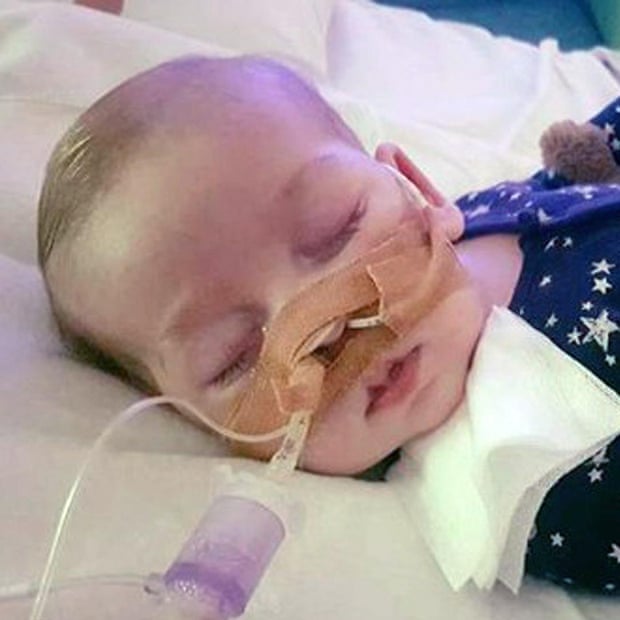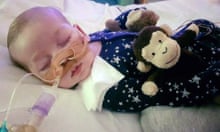Charlie Gard’s parents have been given 48 hours to produce new evidence illustrating how experimental treatment could improve the condition of their critically ill 11-month-old son.
At an emotional high court hearing on Monday, punctuated by angry interventions by Charlie’s parents, Mr Justice Francis said he would be “delighted” to be able to change his mind from his decision in April not to allow the baby to be flown to the US but it would take “drastic” new evidence for him to do so.
Sitting at the high court, he said that by 2pm on Wednesday Connie Yates and Chris Gard must produce the evidence they claim to have, including “when it was published, when it became available to them”. There will then be a hearing on Thursday which could decide Charlie’s fate.
Quick GuideCharlie Gard and mitochondrial disease
Show

What is wrong with Charlie Gard?
Charlie has a very rare mitochondrial disease caused by a genetic defect inherited from his parents. The official diagnosis is infantile onset encephalomyopathic mitochondrial DNA depletion syndrome, referred to generally as “MDDS”.
What is mitochondrial disease?
Mitochondria supply energy to the cells in the human body. Mitochondrial failure leads to cellular injury and cell death. When multiple cells fail, the body’s organs are damaged and shut down. These diseases are usually fatal and kill children, although sometimes they don’t show up until adulthood. Where they don’t kill, they cause serious permanent brain damage.
What is the damage to Charlie?
Charlie is in intensive care at Great Ormond Street hospital in London, the leading children’s hospital in the UK. Life support machines are keeping him alive. The hospital says that he has severe brain damage, cannot move or breathe by himself, is deaf and has epilepsy. It says his heart, liver and kidneys are also affected. His eyelids cannot stay open and because of the weakness of the muscles, his eyes point in different directions and the damage to the brain will not allow his sight to develop.
“I have to decide this case not on the basis of tweets, not on the basis of what might be said in the press, or to the press,” said Francis, acknowledging the huge public interest surrounding it.
As noisy protests in support of Charlie’s parents were held outside the court, lawyers for the two sides – his parents on one side and Great Ormond Street hospital (Gosh) on the other – engaged in heated debate over whether there was any new evidence.
Grant Armstrong, for Charlie’s parents, told the court a US doctor had suggested that, at a “conservative estimate”, the experimental treatment has a 10% chance of working for Charlie.
Yates, 31, intervened to ask the judge: “10%. You would if it was your son, wouldn’t you?”
In response, Francis said that if there was a 10% chance of recovery, including of brain damage, that would be significant and taken into account at Thursday’s hearing.
When the hospital’s lawyer, Katie Gollop QC, was speaking, Gard, 33, shouted: “When are you going to stop lying?”
Gosh previously won permission from the courts to turn off Charlie’s life support systems, on the advice of its own experts who said his condition was irreversible and that further treatment could cause him suffering. The decision of the UK courts was upheld by the European court of human rights. But the hospital applied for a new hearing after receiving a letter from seven doctors urging the hospital to reconsider the possibility of treatment. Presented with the new evidence, the hospital decided to go back to the high court because it is bound by the earlier ruling, which expressly forbade staff from transferring Charlie for nucleoside therapy anywhere in the world.
Earlier, the judge rejected a suggestion by a lawyer representing the baby’s parents that he should remove himself from the case.
At the high court on Monday, Grant Armstrong suggested Francis’s previous ruling against the parents in April raised questions about his capability to hear the latest case fairly.
The argument was given short shrift by Francis who said he had previously made a legal judgment on the facts and was best placed to review the new evidence. “Far from being evidence of bias, we have the antithesis of bias, which is that I did my job, and I will continue to do my job,” said the judge.
The hearing, in a packed courtroom in central London, is the latest in a long-running legal battle over the fate of Charlie, who has severe brain damage and cannot see or hear or breathe for himself because of a mitochondrial condition caused by a faulty gene he inherited.
Francis said: “I don’t think there’s anyone involved who wouldn’t want to save Charlie ... I am at one with the 350,000 [who signed the petition supporting Charlie’s parents].”
Gollop said she had seen nothing that could be called new evidence and that her client had only asked for a new hearing because of the letter from the seven doctors sent from the Vatican children’s hospital and also one from the parents’ solicitor threatening it with judicial review if it did not consider new evidence.
A statement on behalf of the hospital read in court said the legal proceedings had not only placed “extreme strain and stress on those that are treating him” but has been “desperately unfair to Charlie”. It said staff had been forced to take steps contrary to Charlie’s welfare.
Among the supporters outside the court on Monday was Reverend Jim Mahoney, a US pastor and pro-life campaigner who said he has flown to the UK to support Gard’s parents at their behest.
He held a prayer meeting in front of the Royal Courts of Justice, having already claimed that it was prayer that got the legal case reopened.
He denied that he and other third parties were contributing to a media circus around Charlie’s plight, insisting: “The situation is not just affecting Great Britain but the whole world.” He said he was not doing anything in relation to the case without first clearing it with Charlie’s parents.
Before Monday’s hearing, Mahoney announced that the US congress will vote on Tuesday on whether Charlie should be made a US citizen. Mahoney, who said he was not a spokesman for Charlie’s parents but had been asked by them to come to the UK, said the vote would, if passed, “in essence make Charlie a citizen of America for travel”.








